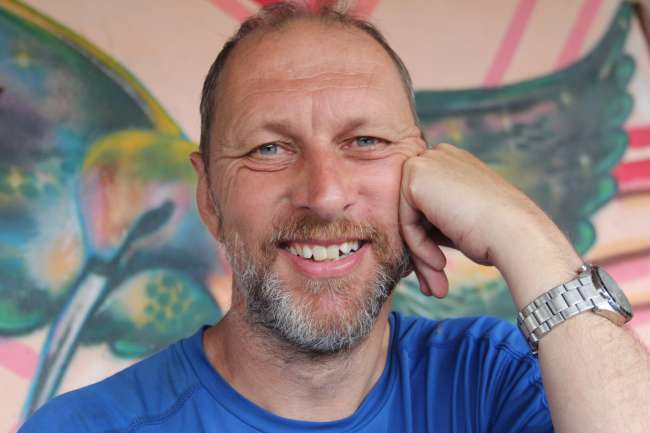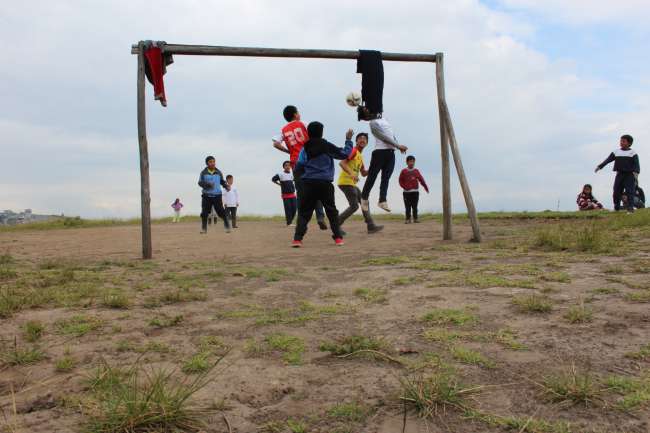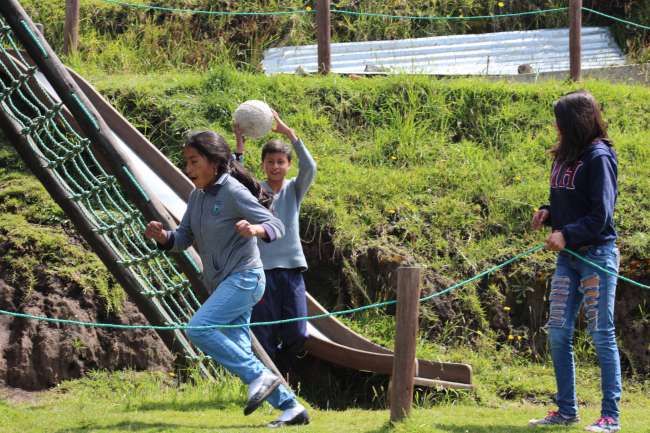Are the children different here?
شايع ٿيل: 27.06.2017
نيوز ليٽر جي رڪنيت حاصل ڪريو
June 27, 2017
Are they different here in Ecuador?
This question I asked myself in advance. In preparation for this educational trip, sorry, this intensive further education, I set myself the goal of determining any differences between the children.
Another thing that I have set out to do here at the foundation is to get to know the fates of children. Not as my future scientific research field or something like that. No, I just want to get to know a few biographies and have them ready to tell. True stories that I can tell the children in class. Without any moral intentions ('yes, you know, we have it good here.'), because they are not necessary. I know from experience that children love such stories. And the thought processes that such stories stimulate in children, I don't want to influence them.
To learn about these fates, I made an appointment with Marco on Friday. I told him my goal. So, nothing about it today and anyway, I don't think I will go into these stories in detail on the blog. Let's see on Friday, okay?
So, what distinguishes the children here from those there?
1.) The children here are not spoiled. Clear to see at the foundation, clear to recognize with the Shuar, and I think this tendency can also be observed in the broader population. But I'm not really sure about that. Because on the weekends, it looks more like spoiling in the parks during picnics and family football games. In any case, here at the foundation, I always see the following behavior: children are doing tasks, or pretending to, or playing. Somewhere there is of course supervision. Either in the room or on the playground. But the children keep doing silly things. Spraying each other with water while brushing their teeth, shooting paper balls at each other, pushing their colleagues into the chair, and such things. But there is no overreaction from the other side. They take it, let it bounce off, or give it back. Eventually, the matter fizzles out and that's it. It practically never happens that someone goes to the supervisor and complains. Maybe to say that their nose is bleeding or something, but not to blame the other person. The children are used to handling things autonomously. The behavior of immediately seeking a protector and putting them forward does not exist here. Of course, the supervisor raises their voice again, identifies the offense of a wrongdoer, and admonishes them to work, but intervening in the sense of mediating: never seen. Unbelievable but true! Because I do that in class, at school, with our children all the time. Clear thing, we educate differently. It's a matter of upbringing.
2.) They are generally much more open, spontaneous, direct, and do not shy away from physical contact at all. Of course, not everyone here is the same. Some are cautious, but others are not at all. It's me who avoids physical contact. Why? Laura told me a week ago that she realized on the weekend trip that she had lice. Logical! No wonder! It's obvious because the little ones climb onto her lap, snuggle up to her, and... have lice. And they like to change hosts through head contact. So, every time a head comes close to mine, I get scared. For example, today I took photos. And of course, as soon as I took the picture, the two heads immediately came close, pressed against me to see the display. Oh my God, immediately turned the camera around and eliminated the danger. Well, the risk is not that great with my sparse hair growth. But still.
And 3.) ???
Nothing third. Children are the same, I claim all over the world. They have the same tricks and strategies in stock, they react to the same jokes, they are curious (open or hidden), they are crazy about toys, sweets, and cell phones, they show the same facial expressions for the same emotions, they all want to be loved... they are simply children.
It is their stories, their experiences that shape them. That's why I'm very excited about Friday. And it's only about the stories for me. Because actually, I accept the children here, whom I already know a little bit individually, just the way they are. I don't want to know what problems the child has at home for the sake of the child. I don't want to know from the face in front of me what terrible things it has seen, when I can simply talk, work, and play with them. It's not important to me because I accept the child as it presents itself, and it accepts me as I present myself.
I'm very glad about that because I can look at a child, a person without prejudice, and interact with them without pity or whatever. I believe that is a quality. What experiences I gain during the course of the relationship and what consequences arise from it, that's another story.
نيوز ليٽر جي رڪنيت حاصل ڪريو
جواب



